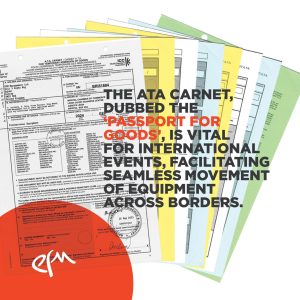International events, from trade expos to brand activations and touring showcases, demand precise logistics. Whether you’re transporting AV gear, demo kits, staging equipment, custom installations or exhibit pieces, clearing customs quickly and efficiently is critical.
For event organisers, production agencies, or technical teams handling overseas setups, even small paperwork errors can lead to delays, penalties, or show-stopping disruptions.
Enter the ATA Carnet, one potential option that is trusted, can save time and acts as a “passport for goods”.
What is an ATA Carnet?
The ATA Carnet (short for Admission Temporaire/Temporary Admission) is an international customs document that enables duty- and tax-free temporary import and export of goods for generally up to 12 months. It’s accepted in over 80 countries and territories, including the UK, EU member states, the US, Japan, and China.
Ideal for transporting non-perishable, non-consumable items, such as AV and lighting rigs, exhibition stands or interactive displays, demo units or prototypes, professional event and production equipment, branded structures or temporary decor.
Key Benefits of Using a Carnet
- Fast-track customs processing: Border officials recognise the Carnet format, reducing inspection times and red tape.
- No import duties or VAT: Temporarily importing under a Carnet provides exemption from customs duties and taxes, provided they are re-exported on time.
- One document, multiple countries: Perfect for multi-country tours, avoiding separate applications at each border.
- Multiple entries and exits: Allows unlimited cross-border movements for all listed items during its validity.
- Reduced financial burden: Eliminates the need for temporary import bonds or bank guarantees in most destinations.
What You Must Know: Critical Limitations
1. Time limits apply
Carnets are valid for a limited time from the date of issue. However, some countries impose shorter stay periods for each visit, these are usually marked on the importation counterfoil. Overstaying, even unintentionally, can result in duties, VAT, and penalty fines. These can soon add up.
2. Re-exportation is mandatory
All items listed must be re-exported from the host country and returned to the country of origin before the Carnet expires. Failure to do so may trigger a charge of up to 110% of applicable duties and taxes, initially covered by the National Guaranteeing Association and later recovered from you.
3. The item list cannot be altered mid-use
Once a Carnet is issued, the list of goods is fixed. You cannot add, remove, or modify items during travel. It is essential to review this list carefully before submission.
4. Replacement Carnets are not always allowed
If your event exceeds the valid period, you may apply for a Replacement Carnet, but critically, not all countries accept them. Applications must be submitted before the original Carnet expires, and approval is not guaranteed.
5. Accurate stamping is essential
Every border crossing, entry, exit, and even transit must be stamped by customs. Missing stamps or incomplete counterfoils can invalidate the Carnet, leaving you liable for duties and penalties.
6. Additional permits may still be required
For specialised equipment (e.g., wireless transmitters, controlled tech), you might still need local regulatory approvals.
Expert Tips to Ensure Carnet Compliance
- Track all timelines: Note both the Carnet’s 12-month expiry and any country-specific re-export dates.
- Check and retain all counterfoils: Customs officials should complete and stamp counterfoils at every entry and exit. Review them immediately to avoid issues later.
- Maintain a complete paper trail: Keep a detailed list of items, serial numbers, photos, and duplicate documentation in case of inspection or dispute.
- Consider Replacement Carnets early: If your import may exceed one year, investigate Replacement Carnet eligibility for all destination countries well in advance.
- Appoint experienced customs agents: In particular for complex, multi-country itineraries or high-value goods, professional handling can prevent costly errors.
🇬🇧 Brexit Impact: Real-World Carnet Consequences
Since Brexit, moving event gear between the UK and EU requires more diligence. One UK jewellery exhibitor at Paris Fashion Week in 2024 was fined 10% of the item value after failing to present a Carnet upon arrival in France, despite having other paperwork in order.
This incident highlights the importance of proper Carnet usage when transporting goods for events across UK/EU borders, even 5 years on. It’s not optional, it’s essential.
Final Thoughts: A Trusted Passport for Event Cargo
When used properly, the ATA Carnet is a powerful tool for event organisers and exhibitors.
Remember:
- Time-sensitive: Respect both the Carnet’s expiry and the host countries’ stay limits
- Stamp-strict: Track every entry, exit, and transit point
- Content-locked: Finalise your item list before issue
- Permit-aware: Check for any required additional documentation.
With careful planning and adherence to these rules, the Carnet becomes more than a document; it’s the passport your artefacts need to travel the world legally, efficiently, and safely.
CTA: Need a ATA Carnet for your event, speak with EFM today


